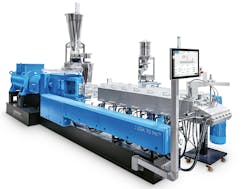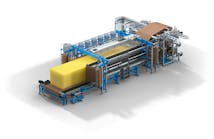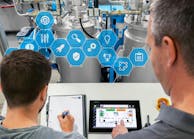RenCom AB, a Swedish company whose founders have a background in the pulp and paper industry, has chosen a Coperion twin-screw extrusion system to produce Renol, a biomaterial designed to reduce the use of petroleum-based plastics.
RenCom, in a joint statement with Coperion, announced it will use a Coperion ZSK twin-screw extrusion system to produce the new biomaterial from lignin, a byproduct of the pulp and paper industry.
Today, 99 percent of that lignin is burned for its energy, but RenCom developed a process that converts lignin so it can be blended with virgin and recycled thermoplastics, creating new types of bioplastics, according to the company. Renol can act as a bio-additive in thermoplastics such as ABS, PE, PET, polylactic acid (PLA), PP and PS.
“Renol is designed to be mixed with other plastics such as ABS, PP ... or more preferably other bioplastics to reduce the total amount of ABS or other plastics in the final product,” RenCom CEO Christopher Carrick said. “Depending on which plastic and how it is done, Renol increases, preserves or decreases the mechanical performance. If you mix Renol with a non-degradable plastic, only the Renol would degrade.”
Carrick said a customer could compound Renol in a 50/50 mixture with PP to reduce the amount of PP in the final product by half. Compounding Renol with PLA in a 50/50 mixture would result in a completely fossil-fuel-free plastic that could be used as a replacement for ABS, for example.
The use of Renol will create fewer greenhouse gas emissions, according to the company.
For every kilogram of petroleum-based plastics replaced by Renol, the amount of carbon dioxide released into the atmosphere is reduced by about 5 to 6 kilograms, according to the company.
RenCom plans to produce up to 1,000 tons of Renol annually beginning in late 2020. The company selected Coperion for its equipment following extensive trials in Coperion’s test lab in Stuttgart, Germany. The complete system will be delivered in October.
Renol can be used to make all kinds of plastic products, including bags, packaging materials, bottles and injection molded parts. It can be used directly in existing production equipment without any modifications to machines or methods, the companies said.
Coperion, in cooperation with RenCom, designed a complete extrusion system consisting of a ZSK Mv Plus-series co-rotating twin-screw extruder, gravimetric feeders, a strand pelletizing system, and a lignin bag-dump station. The ZSK Mv Plus extruder line unites a balanced, large free volume with fast screw speeds and high torque. Deeply cut screw flights result in low thermal stress on the raw material, and the processing is gentle, according to the companies.
“We are proud to supply extrusion process know-how and technology for such a future generation of biomaterial like Renol,” Peter von Hoffmann, Coperion’s GM of business unit engineering plastics and special applications, said.
RenCom expects to have the bioplastic product in the market by 2021.
Bruce Geisielman, senior staff reporter
For more information
Coperion Corp., Sewell, N.J., 856-256-3175, www.coperion.com
RenCom AB, Knivsta, Sweden, www.lignin.se
Bruce Geiselman | Senior Staff Reporter
Senior Staff Reporter Bruce Geiselman covers extrusion, blow molding, additive manufacturing, automation and end markets including automotive and packaging. He also writes features, including In Other Words and Problem Solved, for Plastics Machinery & Manufacturing, Plastics Recycling and The Journal of Blow Molding. He has extensive experience in daily and magazine journalism.






